Gulf of Mexico Report Card Initiative
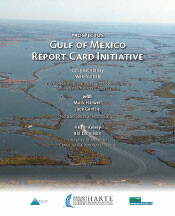 The Harte Research Institute for Gulf of Mexico Studies of Texas A&M University-Corpus Christi, along with its partners Harwell Gentile & Associates, LC, and the University of Maryland Center for Environmental Science, proposes to develop a comprehensive framework for a Report Card on the health of the Gulf of Mexico. Our vision is to develop a graphical representation of the environmental condition of the Gulf that will be scientifically based, widely accessible, and readily understandable by policy-makers, stakeholders, scientists, and, most importantly, the general public. This report details a five-step process model for developing an environmental report card, using the Chesapeake Bay Report Card as an example.
The Harte Research Institute for Gulf of Mexico Studies of Texas A&M University-Corpus Christi, along with its partners Harwell Gentile & Associates, LC, and the University of Maryland Center for Environmental Science, proposes to develop a comprehensive framework for a Report Card on the health of the Gulf of Mexico. Our vision is to develop a graphical representation of the environmental condition of the Gulf that will be scientifically based, widely accessible, and readily understandable by policy-makers, stakeholders, scientists, and, most importantly, the general public. This report details a five-step process model for developing an environmental report card, using the Chesapeake Bay Report Card as an example.
A vision for the Gulf of Mexico Report Card
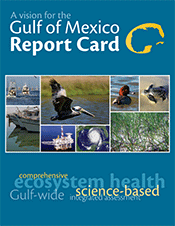 The Harte Research Institute for Gulf of Mexico Studies of Texas A&M University-Corpus Christi, has partnered with IAN and Harwell Gentile & Associates, LC, to develop a vision for a report card on the health of the Gulf of Mexico. The report card will be a graphical representation of the environmental condition of the Gulf that is scientifically based, widely accessible, and readily understandable by policy-makers, stakeholders, scientists, and, most importantly, the general public. The vision document uses birds and seagrass ecosystems as prototypes for two components of the report card. The Report Card prototype was unveiled on December 7 at the Gulf of Mexico Summit in Houston, TX. Next steps include engaging the science community to divide the Gulf into manageable components based on habitats, geographical and/or political boundaries, and develop metrics to assess each component.
The Harte Research Institute for Gulf of Mexico Studies of Texas A&M University-Corpus Christi, has partnered with IAN and Harwell Gentile & Associates, LC, to develop a vision for a report card on the health of the Gulf of Mexico. The report card will be a graphical representation of the environmental condition of the Gulf that is scientifically based, widely accessible, and readily understandable by policy-makers, stakeholders, scientists, and, most importantly, the general public. The vision document uses birds and seagrass ecosystems as prototypes for two components of the report card. The Report Card prototype was unveiled on December 7 at the Gulf of Mexico Summit in Houston, TX. Next steps include engaging the science community to divide the Gulf into manageable components based on habitats, geographical and/or political boundaries, and develop metrics to assess each component.
Texas coast pilot project workshop creates EcoHealth Metrics
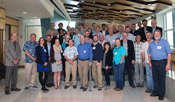 The Harte Research Institute for Gulf Studies at Texas A&M recently hosted a workshop to restart the creation of a Gulf of Mexico Report Card. The project will be initiated by creating eco-health metrics for the Texas coast which will then be scaled up to the entire, and vast, Gulf of Mexico watershed. A vision for the Gulf of Mexico Report Card was created in 2013 and will be used as a framework for this Texas Coast pilot project.
The Harte Research Institute for Gulf Studies at Texas A&M recently hosted a workshop to restart the creation of a Gulf of Mexico Report Card. The project will be initiated by creating eco-health metrics for the Texas coast which will then be scaled up to the entire, and vast, Gulf of Mexico watershed. A vision for the Gulf of Mexico Report Card was created in 2013 and will be used as a framework for this Texas Coast pilot project.
Advancing the Gulf of Mexico Report Card in Mexico and integrating human well-being
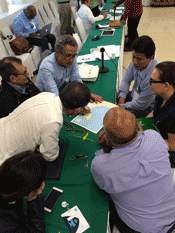 IAN participated in two meetings related to the Gulf of Mexico Report Card project, including a meeting in Villahermosa, Mexico at the University of Tabasco, and at the Harte Research Institute at Texas A&M University in Corpus Christi, Texas. The meeting in Villahermosa was to begin the process for creating a report card for the Mexico portion of the Gulf, and the meeting in Corpus Christi was to begin integrating human health and well-being concepts with ecosystem services into the report card project. Both of these meetings were good opportunities to integrate efforts to ultimately create a Gulf-wide report card.
IAN participated in two meetings related to the Gulf of Mexico Report Card project, including a meeting in Villahermosa, Mexico at the University of Tabasco, and at the Harte Research Institute at Texas A&M University in Corpus Christi, Texas. The meeting in Villahermosa was to begin the process for creating a report card for the Mexico portion of the Gulf, and the meeting in Corpus Christi was to begin integrating human health and well-being concepts with ecosystem services into the report card project. Both of these meetings were good opportunities to integrate efforts to ultimately create a Gulf-wide report card.
Gulf of Mexico Coral Reef Report Card
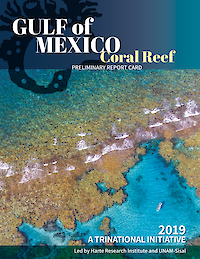
The Harte Institute and the University of Mexico at Sisal released the first-ever report card on the condition of coral reef ecosystems in the Gulf of Mexico. The report card involved representatives from the US, Mexico, and Cuba.
Preliminary Gulf of Mexico Coral Reef Report Card released!
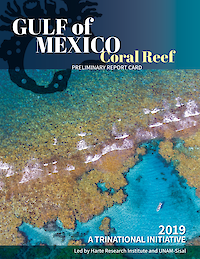
The Harte Institute for Gulf of Mexico Studies and the Autonomous University of Mexico at Sisal released the first-ever report card on the condition of coral reef ecosystems in the Gulf of Mexico. Heath Kelsey facilitated the two-day workshop to create the report card, which involved representatives from the US, Mexico, and Cuba. The report card results indicate that coral reef ecosystems are threatened everywhere, but some areas seem to be doing better than others. The main threats to ecosystem health include increasing ocean temperature, coastal development, and overfishing. In addition to the report card, a video was produced that documents the report card workshop and perspectives on coral reefs throughout the region.
Coral Reef Report Card workshop during the XI Mexican Coral Reef Congress and II PanAmerican Coral Reef Congress

A Coral Reef Report Card workshop was held on September 27th in Veracruz, Mexico as part of the activities of the XI Mexican Coral Reef Congress and II PanAmerican Coral Reef Congress. While in 2019 the Harte Research Institute for Gulf Mexico Studies (HRI) and UNAM-Sisal released a preliminary report card, the goal now is to develop a tri-national quantitative coral reef assessment for the whole Gulf of Mexico.
To highlight the work already done in the region, the workshop included short presentations of report cards developed in Mexico, the U.S., and Cuba. In 2021 in Mexico, Sea&Reef and local partners released a report card for the reefs in the state of Veracruz, while LANRESC, HRI and UNAM-Sisal produced the Alacranes Reef National Park report card for the Yucatán area. In the U.S., HRI developed the first Texas Ecosystem Health Report Card in 2019 and is now working on updates; NOAA and IAN published the Coral Reef Ecosystem Status Reports in 2020, including the Flower Garden Banks and Florida Keys reefs in the northern gulf. Cuba’s report card is hot off the press and will soon be available.
This workshop was special in that rarely people from the U.S., Mexico, and Cuba can engage in in-person discussions. Around 30 participants from universities and government agencies brainstormed ideas on common and shared coral reef socio-ecological indicators and funding options.
Overall, this was a great opportunity to continue building and strengthening a community of practitioners within the Gulf of Mexico region.